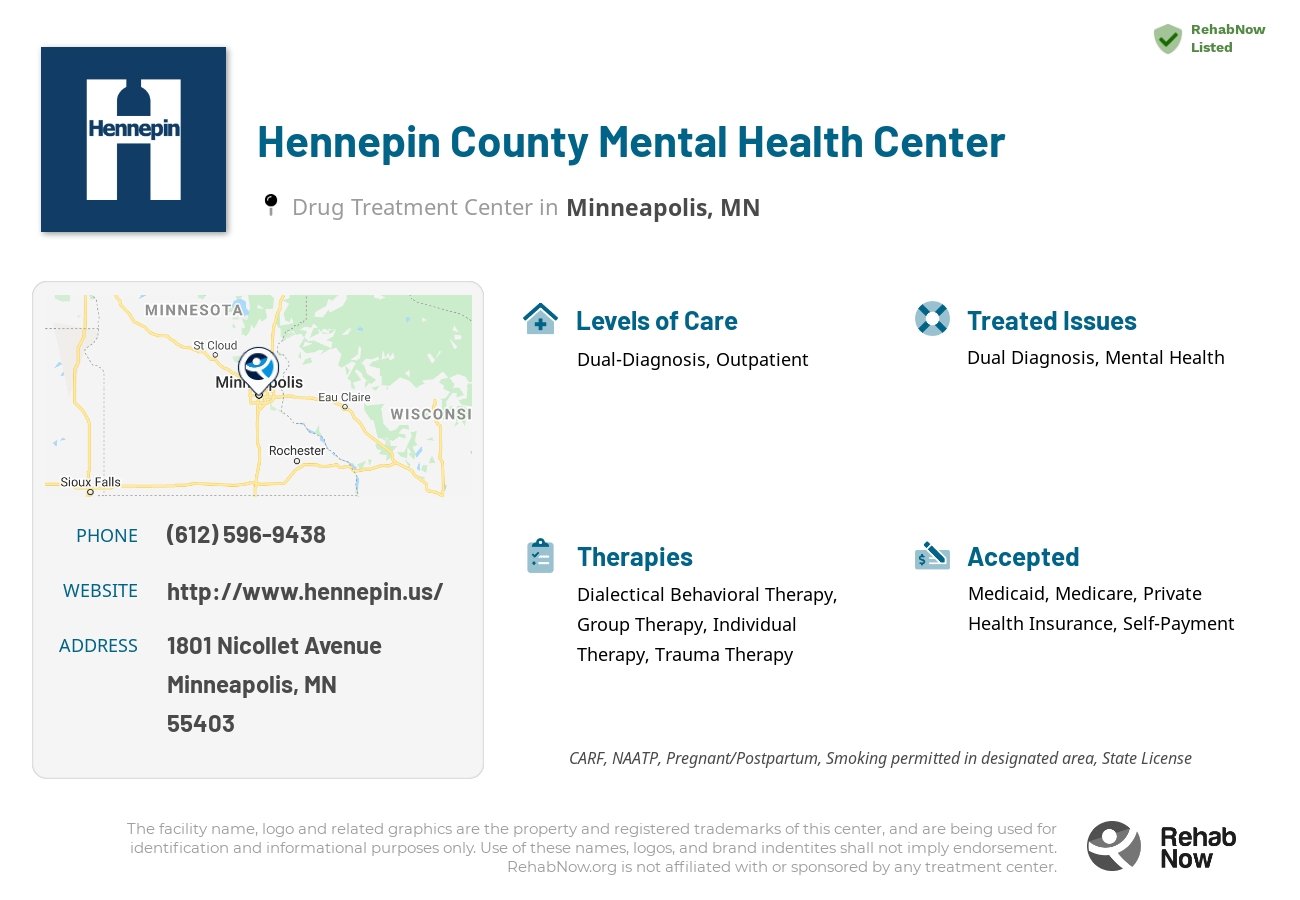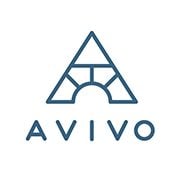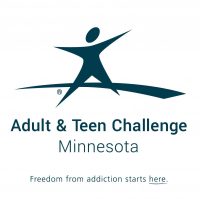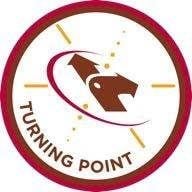
Hennepin County Mental Health Center
Drug Rehab Center in Minneapolis, Minnesota
- Mental Health
- Dual Diagnosis
Hennepin County Mental Health Center provides comprehensive mental health and addiction services to everyone in need, including evidence-based treatments, flexible scheduling options, and accreditation from several organizations.
About This Minnesota Facility
Hennepin County Mental Health Center in Minneapolis, Minnesota is committed to providing comprehensive mental health and addiction services to everyone in need, regardless of their ability to pay. Their highly trained staff and compassionate approach to care make Hennepin County Mental Health Center one of the leading treatment centers in the area. They offer a range of evidence-based treatments and services, including individual and group therapy, medication management, and cognitive behavioral therapy, to help individuals work towards their recovery goals.
At Hennepin County Mental Health Center, they are dedicated to helping people suffering from addiction break free and move towards a healthier, happier life. They provide a full range of addiction services, such as recovery and relapse prevention planning, medication-assisted treatment, dual diagnosis treatment, family support, and support groups. They also offer a range of flexible scheduling options, from intensive outpatient to part-time attendance, to make sure that everyone can access the help they need.
Hennepin County Mental Health Center is proud to have a number of accreditations, including the Joint Commission Accreditation and the Minnesota Association of Mental Health Providers. Furthermore, the Center is a certified provider of the Minnesota Department of Human Services and the Substance Abuse and Mental Health Services Administration. In addition to these accreditations and licenses, Hennepin County Mental Health Center's providers and clinicians have years of experience and expertise, allowing them to provide the best possible care for their clients.
Genders
Ages
Modality
Additional
Conditions and Issues Treated
When addiction and psychiatric issues co-occur, the addict’s recovery is more successful when both conditions are treated. A dual diagnosis refers to a condition in which the patient is diagnosed with two health issues: addiction and bipolar disorder. The most common therapies are psychotherapy, behavioral therapy, spiritual counseling, 12-step programs, and medication management.
Levels of Care Offered at Hennepin County Mental Health Center
This center offers a variety of custom treatment tailored to individual recovery. Currently available are Dual-Diagnosis, Outpatient, with additional therapies available as listed below.
An outpatient treatment program is set up to help with alcohol or drug addiction or a co-occurring disorder. The patient must attend the facility for their therapy and other programs but can return home each night.
The frequency of mandatory attendance decreases after much of Hennepin County Mental Health Center‘s program is complete.
Outpatient treatment is a recovery approach that allows recovering addicts to live at home while getting rehab for addiction
An outpatient can include day treatments which include attending group sessions one hour per week. A person living in an outpatient environment may be allowed the opportunity to work full time if they choose to and continue studies without interruption from drugs/alcohol.
Outpatient treatment is an option for people who want to maintain their careers and families. Outpatients live at home but attend treatment such as individual counseling, group counseling, or twelve-step meetings during the day.
Therapies & Programs
At Hennepin County Mental Health Center , to learn from past mistakes and improve one’s situation, the recovering person meets individually with a therapist. The counselor or therapist will address addiction causes, triggers, mental issues, dual diagnosis, and aftercare plans during this time. This is a very intense and challenging process. Some clients find it easier to open up to someone other than family or friends who understand their struggles with addiction.
In group therapy, recovering addicts meet with a therapist and other people in recovery. Some groups are closed, meaning only people who share the same addiction or problem can attend. Others are open to anyone who wants to stop using drugs or drinking alcohol. Group therapy sessions typically focus on one topic each week or month so that recovering addicts can discuss issues they face daily.
Trauma therapy allows people to face and learn from past traumas.
Many people suffer childhood traumas that lead to adult addiction. During treatment at Hennepin County Mental Health Center [/type], you can move forward in your recovery and reclaim your sober future! Trauma is a common cause of psychological disorders like Addiction Disorder. It’s common in Addictive Disorders patients because traumatized people have strong emotions or thoughts that lead to addictive behaviors.
Dialectical Behavior Therapy (DBT) is a type of therapy created in the late 1980s and early 1990s. It was designed to help people with high rates of suicidal behavior.
The goal of DBT is to teach mindfulness, distress tolerance, emotion regulation, and interpersonal effectiveness to help people learn how to live a life that is no longer controlled by overwhelming emotions and urges.
DBT is beneficial in treating drug addiction because it helps patients understand and cope with their cravings for drugs or alcohol rather than turning to those substances as a way of coping.
Cognitive Behavioral Therapy (CBT) is based on the idea that how we feel, think and act all interact together. It helps people explore their thoughts for problems (or false beliefs) that influence their mood and actions. CBT is very goal-oriented, which means that the therapist and patient work together on a specific problem. In addition to helping a client focus on thoughts that can be changed, CBT also allows them to take an active role in their treatment. Our thoughts determine our feelings and behaviors; our feelings affect our thoughts, and our behaviors change our thoughts and feelings.
Payment Options Accepted
For specific insurance or payment methods please contact us.
Is your insurance accepted?
Ask an expert, call (888) 674-0062
Additional Details
Specifics, location, and helpful extra information.
Minneapolis, Minnesota 55403 Phone Number(612) 596-9438 Meta DetailsUpdated November 25, 2023
Staff Verified
Patient Reviews
There are no reviews yet. Be the first one to write one.
Minneapolis, Minnesota Addiction Information
Minnesota is fighting an opioid epidemic that is leaving hundreds of its residents dead each year. Both prescription opioids and illicit opioids are widely abused in the Land of 10,000 Lakes. Heroin continues to be one of the most commonly abused drugs in the state, if not the most common illicit drug. Over 10% of all treatment admissions in Minnesota list heroin as their drug of choice.
The drug addiction problem in Minneapolis, Minnesota, is relatively bad. About 8.5% of people in Minneapolis abuse drugs. Additionally, there were 536 drug overdose deaths in 2016, a 20% increase from the previous year. There were 5,191 treatment admissions for primary alcohol dependence in 2016. Some of the most common programs include inpatient rehab, outpatient rehab, and sober living homes.
Treatment in Nearby Cities
- Northfield, MN (35.5 mi.)
- Pine City, MN (61.2 mi.)
- Cottage Grove, MN (18.9 mi.)
- Kasson, MN (69.7 mi.)
- Litchfield, MN (62.1 mi.)
Centers near Hennepin County Mental Health Center



The facility name, logo and brand are the property and registered trademarks of Hennepin County Mental Health Center, and are being used for identification and informational purposes only. Use of these names, logos and brands shall not imply endorsement. RehabNow.org is not affiliated with or sponsored by Hennepin County Mental Health Center.





